civilwarbuff
Member
Here is the thread that is being demanded by multitudes (well, at least 2).
Not all Christians agree (imagine that) on the geographical boundaries of the land God promised Israel would belong to them. Those boundaries can include the Nile River, the Sinai Peninsula and large parts of present day Iraq and even Iran. What is posted below is what I believe is supported in the OT as the promised land. Please feel free to make your own case if you disagree but it should be supported by scripture and map that are generally accepted by scholars.
http://www.differentspirit.org/articles/boundaries.php
Boundaries of the Promised Land
I will plant Israel in their own land, never again to be uprooted from the land I have given them”
~ Amos 9:15
Some 3,500 years ago the Canaanites inhabited the land that God promised to give to the offspring of Abraham, Isaac and Jacob (see Timeline). God promised that He would give the land of Israel to the Jewish people as an eternal possession. The promise was unconditional. God confirmed it at least 55 times with an oath and stated at least 12 times that the covenant was everlasting (see Bible References).
God did bring the Israelites into the Promised Land forty years after the Exodus from Egypt. Israel reached the peak of her power some 500 years later under King Solomon.
The map shows the area that Israel controlled at that time. It almost matched the boundaries of the land that God had promised. Gaza was not taken from the Philistines in Solomon’s day, and the land of the Canaanites promised to Abraham included the coastal strip all the way to Sidon – the city of Canaan’s first-born son.
[1 Chronicles 1:13, Genesis 10:19]
Areas of Moab, Ammon and Edom, east of the Dead Sea, were occupied by King Solomon but were not part of the Promised Land. This is part of modern-day Jordan.
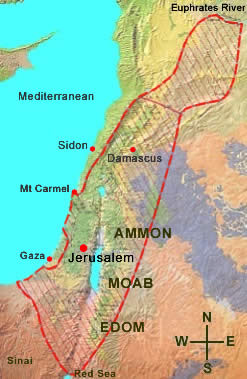
Israel entered the Promised Land and hundreds of years later, under King Solomon, they occupied a large part, but not all, of the territory which God had promised to them. Israel was required to obey the Law of Moses and, when they failed, God thrust them out of the land. However, God’s promise that they will inherit the land still stands. We see the Jews being brought back to the Promised Land in our day. We expect that God’s word will be fulfilled and that they will enter their full inheritance. The next question is: What are the boundaries of the Promised Land as described in the Bible?
Scripture indicates that the boundaries of the Promised Land are as follows:
South:
From the Red Sea, in the region of Eilat today, to the Sea of the Philistines which would be the Mediterranean Sea near Gaza. This southern line was to a point called the River of Egypt, or the wadi of Egypt (which was certainly not the Nile River) on the Great Sea – another name for the Mediterranean. [Exodus 23:31; Ezekiel 47:19; Genesis 15:18].
The Red Sea
and the coast road of the Sinai Peninsula just south of Eilat.
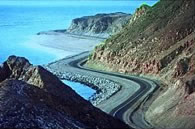
West:
The coastline of the Mediterranean – called, in those days, the Great Sea [Numbers 34:6; Ezekiel 47:20].
Mediterranean coastline
at Caesarea.
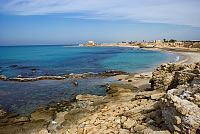
North:
From the Great Sea, or Western Sea – other names for the Mediterranean – through what is Lebanon and Syria today to the Euphrates River in the north [Genesis 15:18; Deuteronomy 11:24; Ezekiel 47:17; Joshua 1:4].
The mountains of Lebanon
seen from the Hula Valley in Israel’s north.
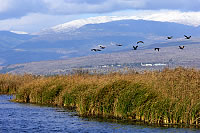
East:
From the Euphrates River in the north, extending south, past Damascus, along the slopes on the eastern side of the Sea of Kinnereth, what we know as the Golan Heights today. The Kinnereth is also called the Eastern Sea in Scripture and is what we know as the Sea of Galilee.
The Sea of Galilee
– the Bible calls this the Sea of Kinnereth or the Eastern Sea.

The Jordan River rises in the mountains of Lebanon and runs south to the Sea of Galilee. At the southern end of the Sea of Galilee the Jordan River flows out and along the Jordan Valley to enter the Dead Sea. The eastern side of the Jordan River, south of the Golan Heights, represents the boundary of the Promised Land [Numbers 34:11-12; Ezekiel 47:18].
The Dead Sea
or Salt Sea as it is called in the Bible.
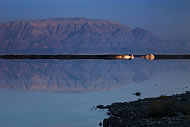
Although some of the geographical reference points mentioned in Scripture are difficult for us to identify, God knows the full area into which He is going to bring Israel. We know enough to be sure that Israel is not in her full inheritance yet.
The Bible refers to significant points that we can identify – the Sea of Kinnereth being the Sea of Galilee; the Salt Sea being the Dead Sea; and places such as Gaza and Sidon, where there is no doubt about the ancient location. Archaeology has given us proof.
What we can say is that the Promised Land stretches from the Red Sea, around Eilat, as a southern boundary, to the Mediterranean at a point south of Gaza and extending from there up the coastline at least as far north as Sidon in Lebanon, to form the western boundary, then north to the Euphrates River, to form the northern boundary, and down the line of the Jordan River to form the eastern boundary.
This area would encompass the Palestinian territories of the West Bank, also called Judea and Samaria, and Gaza. Certain world leaders may be looking for the establishment of a Palestinian state separate from Israel, but God’s Word makes a different judgment. God says that this is the land that He promised to the descendants of Abraham, Isaac and Jacob.
Scripture shows that God has a dispute with those who are involved in “dividing up My land” [Joel 3:1-2].
Not all Christians agree (imagine that) on the geographical boundaries of the land God promised Israel would belong to them. Those boundaries can include the Nile River, the Sinai Peninsula and large parts of present day Iraq and even Iran. What is posted below is what I believe is supported in the OT as the promised land. Please feel free to make your own case if you disagree but it should be supported by scripture and map that are generally accepted by scholars.
http://www.differentspirit.org/articles/boundaries.php
Boundaries of the Promised Land
I will plant Israel in their own land, never again to be uprooted from the land I have given them”
~ Amos 9:15
Some 3,500 years ago the Canaanites inhabited the land that God promised to give to the offspring of Abraham, Isaac and Jacob (see Timeline). God promised that He would give the land of Israel to the Jewish people as an eternal possession. The promise was unconditional. God confirmed it at least 55 times with an oath and stated at least 12 times that the covenant was everlasting (see Bible References).
God did bring the Israelites into the Promised Land forty years after the Exodus from Egypt. Israel reached the peak of her power some 500 years later under King Solomon.
The map shows the area that Israel controlled at that time. It almost matched the boundaries of the land that God had promised. Gaza was not taken from the Philistines in Solomon’s day, and the land of the Canaanites promised to Abraham included the coastal strip all the way to Sidon – the city of Canaan’s first-born son.
[1 Chronicles 1:13, Genesis 10:19]
Areas of Moab, Ammon and Edom, east of the Dead Sea, were occupied by King Solomon but were not part of the Promised Land. This is part of modern-day Jordan.

Israel entered the Promised Land and hundreds of years later, under King Solomon, they occupied a large part, but not all, of the territory which God had promised to them. Israel was required to obey the Law of Moses and, when they failed, God thrust them out of the land. However, God’s promise that they will inherit the land still stands. We see the Jews being brought back to the Promised Land in our day. We expect that God’s word will be fulfilled and that they will enter their full inheritance. The next question is: What are the boundaries of the Promised Land as described in the Bible?
Scripture indicates that the boundaries of the Promised Land are as follows:
South:
From the Red Sea, in the region of Eilat today, to the Sea of the Philistines which would be the Mediterranean Sea near Gaza. This southern line was to a point called the River of Egypt, or the wadi of Egypt (which was certainly not the Nile River) on the Great Sea – another name for the Mediterranean. [Exodus 23:31; Ezekiel 47:19; Genesis 15:18].
The Red Sea
and the coast road of the Sinai Peninsula just south of Eilat.

West:
The coastline of the Mediterranean – called, in those days, the Great Sea [Numbers 34:6; Ezekiel 47:20].
Mediterranean coastline
at Caesarea.

North:
From the Great Sea, or Western Sea – other names for the Mediterranean – through what is Lebanon and Syria today to the Euphrates River in the north [Genesis 15:18; Deuteronomy 11:24; Ezekiel 47:17; Joshua 1:4].
The mountains of Lebanon
seen from the Hula Valley in Israel’s north.

East:
From the Euphrates River in the north, extending south, past Damascus, along the slopes on the eastern side of the Sea of Kinnereth, what we know as the Golan Heights today. The Kinnereth is also called the Eastern Sea in Scripture and is what we know as the Sea of Galilee.
The Sea of Galilee
– the Bible calls this the Sea of Kinnereth or the Eastern Sea.

The Jordan River rises in the mountains of Lebanon and runs south to the Sea of Galilee. At the southern end of the Sea of Galilee the Jordan River flows out and along the Jordan Valley to enter the Dead Sea. The eastern side of the Jordan River, south of the Golan Heights, represents the boundary of the Promised Land [Numbers 34:11-12; Ezekiel 47:18].
The Dead Sea
or Salt Sea as it is called in the Bible.

Although some of the geographical reference points mentioned in Scripture are difficult for us to identify, God knows the full area into which He is going to bring Israel. We know enough to be sure that Israel is not in her full inheritance yet.
The Bible refers to significant points that we can identify – the Sea of Kinnereth being the Sea of Galilee; the Salt Sea being the Dead Sea; and places such as Gaza and Sidon, where there is no doubt about the ancient location. Archaeology has given us proof.
What we can say is that the Promised Land stretches from the Red Sea, around Eilat, as a southern boundary, to the Mediterranean at a point south of Gaza and extending from there up the coastline at least as far north as Sidon in Lebanon, to form the western boundary, then north to the Euphrates River, to form the northern boundary, and down the line of the Jordan River to form the eastern boundary.
This area would encompass the Palestinian territories of the West Bank, also called Judea and Samaria, and Gaza. Certain world leaders may be looking for the establishment of a Palestinian state separate from Israel, but God’s Word makes a different judgment. God says that this is the land that He promised to the descendants of Abraham, Isaac and Jacob.
Scripture shows that God has a dispute with those who are involved in “dividing up My land” [Joel 3:1-2].


